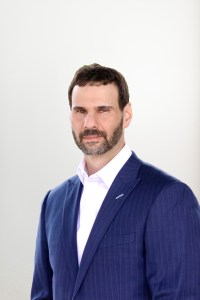Expert Insights: Ryan Severino Talks New York CRE, Challenges for Office Market in 2024 & More

For our latest interview in the Expert Insights Series, we had the pleasure of speaking with Ryan Severino, CFA, managing director, chief economist, and head of U.S. research at BGO.
Severino has 25 years of economics, real estate, and investment research experience in real estate asset management, portfolio management and acquisitions. He’s also an adjunct professor at both Columbia University and New York University, where he teaches a variety of courses, such as urban economics; portfolio and risk management; microeconomics; and macroeconomics.
Below, he shares with us his thoughts on the current state of the commercial real estate (CRE) market, the major challenge that the office market is expected to encounter in 2024, and other valuable insights.
Q. Tell us about your background and why you chose your career.
I am a very curious person and I have always loved learning, even from a young age. The challenge, for me, has always been that I’m interested in too many things. I stumbled upon economics as an undergraduate and immediately loved it and continued my studies through graduate school.
Thankfully, my love of economics provides me with the opportunity to think about so much of what’s going on in the world. Understanding the economy requires a synthesis of many topics, and I enjoy things that are challenging. And, like economics, I stumbled into real estate. I love the asset class, especially because it has such direct connections to the economy, which enables me to work in an applied field and not just traffic in theory.
But, I’m also a massive extrovert, so it is great for me that real estate is a relationship-oriented business. As much as I love economics, computer coding and mathematics, I would wither on the vine if I had to sit behind a computer screen all day. As an economist in the real estate industry, I have the perfect combination of technical application and social interaction. I also teach as an adjunct professor, which really lets me combine the theoretical and the practical.
Q. How has the real estate industry evolved in the past few years?
The real estate world feels inverted from when I first started in the industry. Back then, the favored institutional property types were office and retail. Now, the favored property types are industrial and apartments. While that has occurred over a period of decades, the last few years have accelerated that change. And, we are still working through the reverberations of the pandemic that caused this acceleration. That will still take time to play out. But, as the economy has evolved, so has the real estate industry. I find that amusing because the layperson often thinks what we do is boring, but I find it quite interesting and surprisingly dynamic.
Q. What differentiates the commercial real estate market in New York from other major markets in the United States?
Two things really stand out to me: First, New York is the most densely populated large city in the U.S. by more than 50% versus the next-densest peer. Second, four of the five boroughs are either islands or on an island. And, aside from a stretch of Queens and Brooklyn, the boroughs are not really adjacent to each other. Traversing bodies of water takes on an outsized role. That means two key things: First, the city must maximize the value of its land by building vertically. Connecting to my point above about the world flipping, we now see multi-story industrial buildings in New York to capitalize on industrial’s strong position, but also maximize the value of the land. Second, infrastructure takes on an outsized role. New York certainly isn’t the only city where that matters but, given the naturally occurring boundaries, it requires a greater variety of solutions, which could seem ironic in such a dense space.
Q. What do you think will be the biggest challenge for the office market in 2024?
Some empirical research shows that, when economies go through exogenous shocks, it can take up to five to six years for those shocks to stop reverberating. The office economy experienced such a shock, and I don’t think it is done reverberating. However, the macroeconomy is set to slow in 2024. At a minimum, uncertainty over the outlook is increasing. That will likely delay the end of this reverberation [just] as a more-challenging economic environment will delay decision-making by organizations. Once that uncertainty passes — coupled with more time passing from the onset of the pandemic — organizations will figure out their best path forward in how to utilize office space. Once that occurs, the office market will have a clearer idea of where demand stands, which building might need to get repurposed, etc.
Q. What is your general assessment of the commercial real estate market in 2023?
On the fundamentals side, the industry has been incredibly resilient. Of the four major property types, three boast vacancy rates at or near historically low levels. Office, of course, is the outlier. Rent growth has slowed in those three favorable types, but generally remains positive.
On the capital markets side, things have been bumpier. Typically, cap rates fare well during periods of rising interest rates, but this time is different. Interest rates are going up in a slowing economic environment. And, while not a recession per se, the economy contracted in the first half of last year and continues to slow down. That means the normal downward pressure on cap rates from property market fundamentals is not present this cycle. Typically, interest rates go up in an improving economic environment, which benefits property market fundamentals. This time, rates have gone up during a period of slowing, meaning there is no countervailing force to rising interest rates. That has made the capital markets more challenging.
Q. Are there any lessons from the past few years that you would impart as an absolute must for those looking to get into the CRE industry?
Be a constant learner. I practice what I preach here. The world is changing — faster than ever in some respects — and real estate evolves along with those changes. The way the real estate economy behaves has not fundamentally changed, but the ways in which space is utilized and the methods of analysis are changing, along with the world. I could make this assertion of many industries, but this is where the perception of real estate as a staid asset class does not meet the reality of how things operate.
Also, be prepared. Over the course of my career, the industry itself has evolved and the techniques that I use have changed accordingly. I suspect this will be true for most of us the industry in the future.
Q. Any other insights that you’d like to share?
Over the course of my career, the real estate industry has become a much bigger tent. It still has work to do in becoming more inclusive, but I see much greater diversity than when I first started, even for someone nerdy like me. Once upon a time, roles like mine didn’t really exist or were relegated to luxuries among the largest institutions. Now, in a world of large data and rapid change, organizations realize having people who have sound technical skills is not a luxury, but a necessity.
Interested in being interviewed for our Expert Insights series? Feel free to reach out to us at contributors@commercialcafe.com or check out other articles from our series here.

